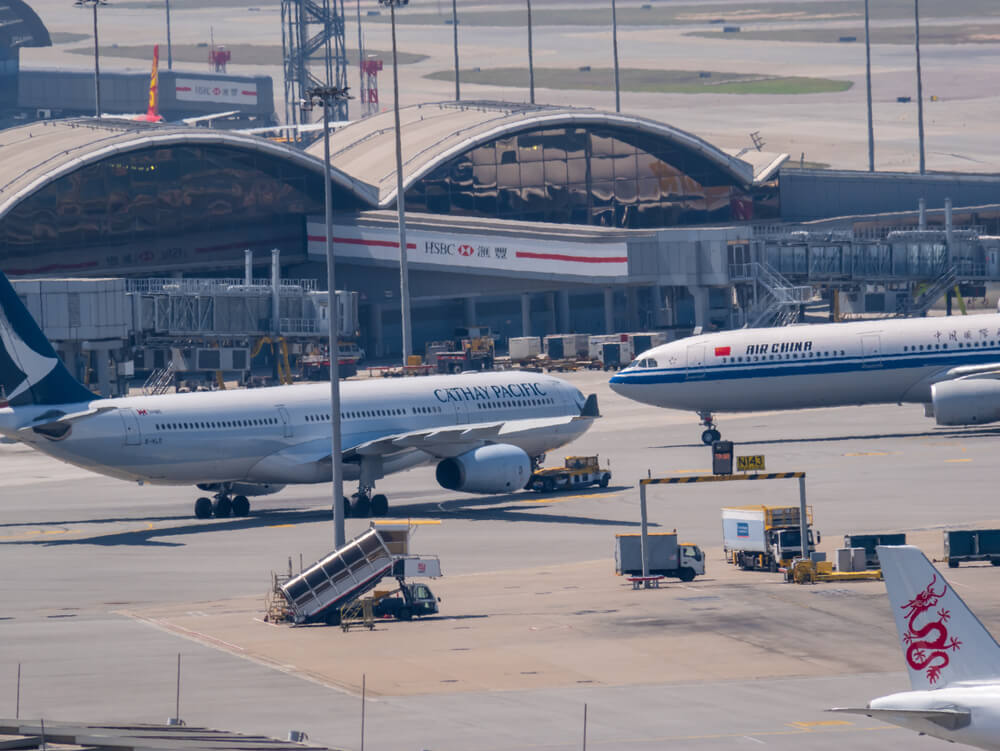Article updated on August 14, 2019
As protests in Hong Kong continue, tensions have risen further between the autonomous region and mainland China. On Friday, August 9, 2019, Beijing targeted one of the most well-known brands in Hong Kong – Cathay Pacific. The Civil Aviation Administration of China (CAAC) has notified the carrier that any staff participating in the ongoing protests would be banned from working on flights to mainland China or flights operating in Chinese airspace.
In a statement issued on August 9, 2019, the aviation authority justified the move citing “the principle of zero tolerance for safety hazards, in order to maintain air transport order, protect passenger safety, and prevent airborne activities from causing damage to third parties in the air, on the ground and on the surface of the water […]”.
Complying with the order, which came into effect on August 10, Cathay Pacific submitted lists identifying flight crews that would operate within Chinese air space. If the airline failed to provide the identification, the flight would not be approved to fly over or into mainland China.
Cathay Pacific will also have to provide details on how the airline will “strengthen internal control and improve flight safety and security” to Chinese authorities by Thursday, August 15.
Caving in under pressure
In a press conference discussing Cathay Pacific’s H1 2019 financial results, the company’s chairman, John Slosar, said that the airline would not prohibit staff to participate in the protests, further adding that the company “certainly wouldn‘t dream of telling them what they have to think about something“.
The order from the CAAC forced Cathay to change its stance. According to SCMP, a memo was sent out to staff on August 12, 2019, indicating that the airline is willing to take action towards employees who “support or participate in illegal protests”. Potentially, staff may face “termination of employment”.
One Cathay Pacific pilot was already arrested during the riots on July 28, 2019. Subsequently, the airline suspended him from flying. The pilot was released on bail.
The airline had no choice but to cave in, as Cathay Pacific operates 23 routes to mainland China, with many more flights going through Chinese air space. Canceling or diverting these routes would potentially hit the already fragile finances of the airline – Cathay is trying to get back to long-term profitability, after posting a profitable 2018 and H1 2019.
Hong Kong and mainland China is by far the biggest revenue stream for Cathay Pacific, as the region accounted for $3.3 billion (HK$ 26,352 billion) out of the total $6.8 billion (HK$ 53,547 billion) revenue earned in H1 2019.
Cathay Pacific has previously indicated that the airline group expects the trend of achieving better results in H2 of this year to continue, but the difficult climate surrounding Hong Kong might change the plan of completing the transformational process at the end of 2019.
The airline is already looking at a downturn of bookings and Cathay’s stock is at the lowest trading point in 10 years. This comes as Hong Kong International Airport (HKG) has canceled flights on August 12, after protesters organized a sit-in at the airport due to police violence on Sunday, August 11.
With the exception of flights departing Hong Kong that have already completed the check-in process, as well as inbound flights that are already heading to Hong Kong, all other flights have been cancelled for the rest of today.
— Cathay Pacific (@cathaypacific) August 12, 2019
UPDATE: As of August 14, 2019, the airport has resumed normal operations. Passengers are still adviced to check their flight status prior to their departure from Hong Kong International (HKG).
Operations in Hong Kong International Airport including check-in services have resumed normal. Please check your flight status at https://t.co/mkS9F2LDcW before proceeding to the airport. Once again, thank you for your understanding.
— Cathay Pacific (@cathaypacific) August 13, 2019
While the amount of bookings lost so far is unclear, the company is due to reveal their results for July 2019. Potentially, July can end up being the first month of decreased passenger numbers for Cathay Pacific in 2019 as the protests in Hong Kong further escalate.

